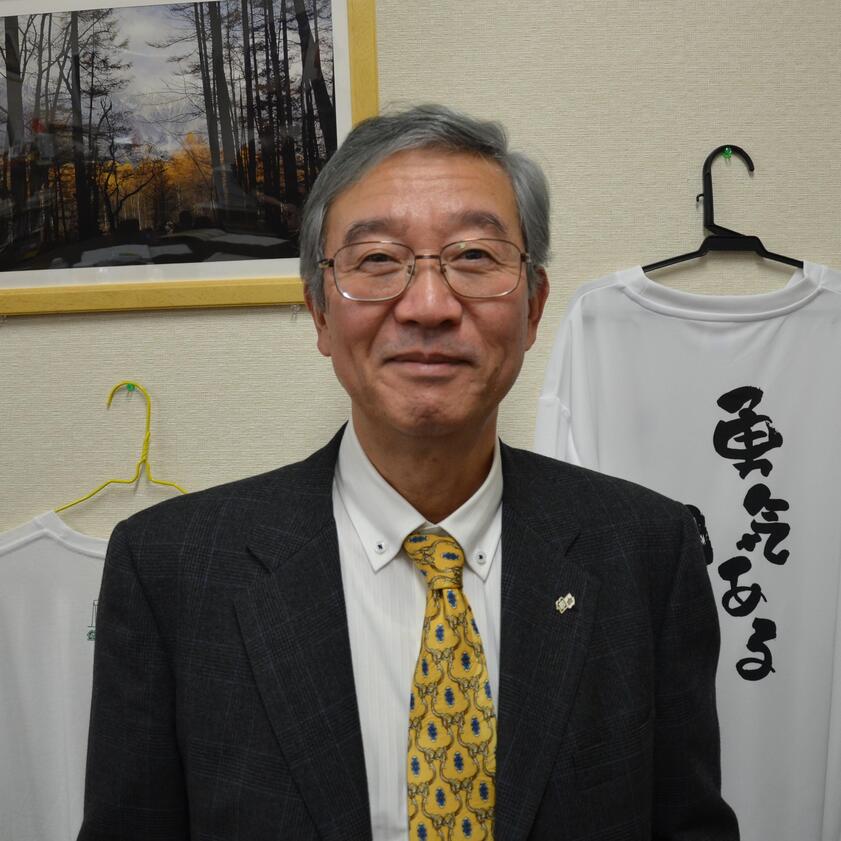Professor Ryuichiro Higashinaka

Researchers'
Vice President
Yoshihito Watanabe
Looking back on my life as a researcher, at many times, my own research was not progressing well and I was envious of the research topics of other researchers who were (seemingly) making progress. However, in retrospect, I feel satisfied that I was able to proceed with a research topic I was confident about. I also realize that it is important to push forward without always being happy or sad. Researchers, like chefs, need to have the spirit of "giving everything you have with one kitchen knife" to be able to conduct research anywhere.
My research targets enzymes (proteins) that catalyze chemical reactions in the body. They are proteins that contain iron, similar to hemoglobin in the blood you are all familiar with. At first, you may think it is biology, but chemistry is inside. Hemoglobin carries the oxygen that we breathe in through our bodies, and by replacing some of the amino acids with others, we can turn it into an enzyme that catalyzes the chemical reactions we want.
I was a student in the Department of Chemistry in the Faculty of Science, so my thesis was my first step as a researcher. I was able to compete in my current research field likely because of my five years of study in the US. There, I studied the reaction mechanisms of enzymes using simplified chemical models of metalloenzymes (metal complexes). Specifically, I conducted research to directly observe unstable intermediates assumed in enzyme reactions using model complexes. After returning to Japan, I gradually shifted to research using actual proteins, and have been doing so ever since.
Crystal structure of a complex composed of enzymes and decoy molecules, which selectively transforms benzene to phenol (The decoy molecule was designed by Dr. Watanabe and colleagues to change the enzyme's substrate selectivity.)
The reality is that research does not always proceed as expected, even if you try your best. When you are thinking hard, you cannot come up with good ideas, but when you are doing something else, there is a moment when an idea comes to your mind. Furthermore, when I try an experiment, it sometimes works (with many failures, of course). This is what makes research so interesting!
I would have to say the G30 program. We started this program by thinking and devising everything on our own. It was difficult to plan, and at the beginning of the program, we were anxious about how many students would apply. Thanks to the cooperation of everyone at the university over the past 10 years, we now have over 500 applicants, and the graduates have begun to advance to their own careers.
I usually listen to NHK FM, so I do not really have a specific song I listen to. If I had to choose, I listen to Chie Ayado's CDs relatively often.
I have been part of Nagoya University for about 17 years. I was surprised that I had never been a member or tenured in the same organization for such a long time. I believe that many of you have spent more than 30 years at Nagoya University. When you stay in the same place for a long time, you become comfortable and tend to be conservative about various things. As the world is changing at a dizzying pace, I would like you to keep challenging yourself to do something different.
Name: Yoshihito Watanabe
Department: Vice President (International Affairs and Public Relations)
Career history and hobbies:
Graduated from the faculty of Science of Tohoku University, and later obtained a PhD in Chemistry from the University of Tsukuba (March 1982). He was a postdoctoral fellow at the University of Michigan, senior researcher at Princeton University, an assistant professor at Keio University School of Medicine, assistant professor at the Faculty of Engineering at Kyoto University, and a professor at the Institute for Molecular Science before becoming a professor at Nagoya University in 2002. His hobbies include softball, skiing, playing guitar, and randomly reading paperbacks.